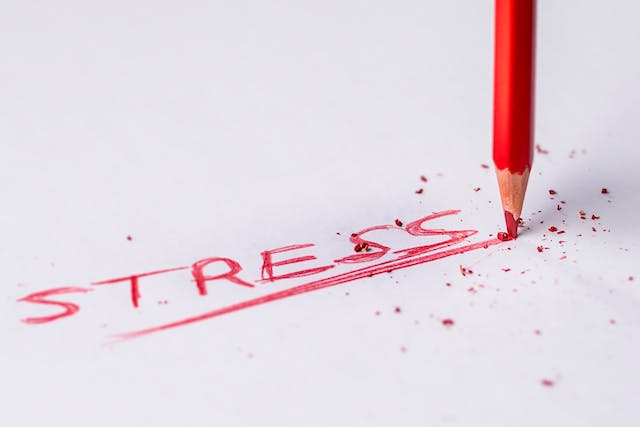According to research from the American Psychiatric Association, almost two out of five Americans considered their mental health fair or poor. About a quarter of them anticipated stress. People are increasingly concerned about personal finances, physical and mental health, job security, relationships, and general uncertainty about what the future may hold.
We live in stressful times, and so increasingly, people are seeking ways to deal with the consequent emotions and feelings. Many try physical exercise, meditation, and taking a break to reduce feelings of stress.
One of the most effective things to try, however, is to increase your communication, whether that means talking with friends and family, a therapist, or someone with whom you’re experiencing conflict. Let’s take a closer look at the causes of stress, why it’s important to reduce stress, and how communication can help fast.
Table of Contents
What Is Stress?
Stress is a normal human response to a feeling of threat or challenge and can express itself through mental, physical, and physiological effects, such as an inability to concentrate, headaches and other bodily pains, shaking, increased heart rate, and inability to sleep.
Some stress is normal and even helpful. For example, before performing on stage, running a sprint, or giving a presentation, it’s normal to feel nervous. This can heighten your awareness and give you the energy to perform at a peak level. But when the feeling of stress continues in the long term or gets in the way of your performance, this can be detrimental to your health, work, and relationships.
In the case of prolonged stress, it’s best to find a professional who can help choose the right strategy for managing it. In the meantime, let’s discuss what you can do to keep stress at bay.
The Importance of Stress Management
Too much stress or not knowing how to manage stress can make you feel overwhelmed and lead to physical and mental health problems. Common mental and physical symptoms of too much stress include:
- Headaches
- Upset stomach
- Loss of appetite
- Over-eating
- Trouble sleeping
- Increased use of substances, such as tobacco and alcohol, as coping mechanisms.
While everyone copes with stress differently and may find different things stressful, the problems associated with too much stress are common.
Communication is key to reducing stress fast. Alone or in tandem with other stress-reducing methods, such as exercising, getting enough sleep, and having a daily routine, communicating is very effective at reducing stress.
How Communication Can Help Manage Stress
Connecting with Others
The feeling of connection engendered through talking with others can help you reduce stress. It’s often true that sharing a problem can make the problem seem less severe. What’s more, the sheer act of sharing something that’s worrying you can inspire empathy in others and lead to a moment or true connection that is great for reducing stress in a workplace or a personal relationship.

Get Help
Communicating your stress gives the person hearing you the opportunity to understand the situation and respond. It may deepen their understanding of underlying issues that are causing the problem. Other people are often the solution to a stressful situation, but they aren’t always able or willing to read the signs to know that you’re suffering, necessitating clear communication on your part.
Understand Your Stress
Being more open about communicating your stresses may also help deepen your awareness of stress. Considering stress encourages you to address its cause and think about the feeling itself as well as the surrounding issues. This activity makes it less likely that you’ll try to ignore or suppress your emotions and feelings, the typical result of which is for those stresses to manifest elsewhere.
Ensure Everyone Is Heard
One of the prime causes of stress is when one or both parties feel that the other has not taken notice of what they’ve said. The parties involved don’t need to agree to reduce stress. But clear acknowledgment that they have each heard and understood the other’s viewpoint can go a long way to reducing conflict and stress.
Effective Communication to Reduce Stress
Stress itself can make communication challenging. However, hold onto the following pillars to overcome any communication difficulties and reduce stress.
Start in the Right Place
Stress doesn’t make it easy to communicate. Unfortunately, sometimes, the first time a colleague, friend, or family member knows someone is stressed is when they are in a shouting match.
For effective communication, do your best to stay focused and calm. It’s best not to communicate in anger or frustration or while distracted. If you feel yourself losing control during the conversation — often evidenced by shallow breath, flushed features, stomach ache, and increased physical tension — give yourself permission to exit the situation and try again when you’re calmer.
To calm yourself, focus on your breathing and attempt to relax your muscles. Listening to music, going for a walk, or doing some other physical exercise can also help you clear your head.
Assertiveness
Be direct to make sure you get your point across. Some mistake assertiveness for aggression. Being assertive can be described as speaking in a way that’s clear and direct. Telling people how you feel, what you expect, what you want, and what concerns you in simple, straightforward language can get the best from people.
Be Concise
Clarity doesn’t mean talking at length. Make your message to the point so that you keep people’s attention and aid their understanding. Communicating concisely helps give people a clear idea of what issues are and what they are supposed to do. Making a list of what you want to say beforehand can help you keep your communication concise. It will stay on track, and you’ll be able to say what you need to express yourself.
Avoid Global Statements or Assigning Blame
If someone has upset you, it’s usually more productive to talk about how you feel than what you might think the other party has done wrong. Turning the focus onto your feelings helps avoid the other party feeling victimized or blamed, which can hinder communication, let alone resolution.
Take It Slowly
As much as we might like it to be, communication isn’t necessarily going to solve stress in one conversation or email. Expressing yourself, learning to listen actively, and participating in the back-and-forth of sharing ideas can aid stress management over time.
Final Thoughts
Communication has a pivotal role to play in stress management. It can help people understand the causes of their stress, alleviate the symptoms, and remediate the problems. With excellent communication, you can also learn to avoid interactions and events developing into stressful situations. Whether chatting with friends or communicating your viewpoint in a workplace or formal environment, the principles of effective communication will help you and those around you.
Featured Photo by Pedro Figueras: pexels.com




